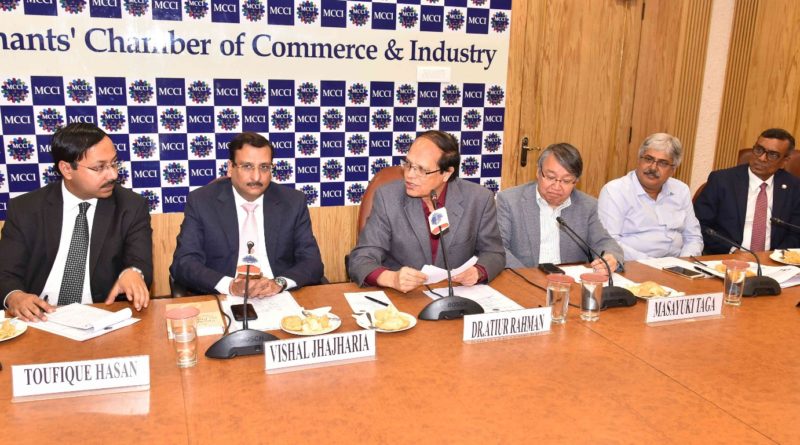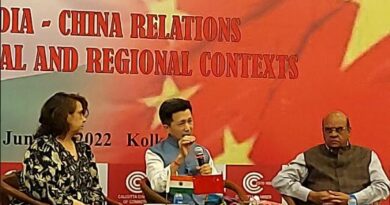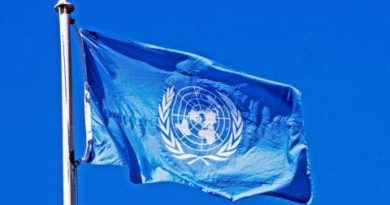Indo-Bangla talk to boost economic cooperation
An
interactive session was organized by Merchants’ Chamber of Commerce &
Industry in Kolkata recently to promote trade and people to people multi-
sectoral cooperation .The session was attend by Dr. Atiur Rahman, Former
Governor, Bangladesh Central Bank & Professor, Dhaka University and Guest
of Honour : Mr. Toufique Hasan, Deputy High Commissioner, People’s Republic of
Bangladesh in Kolkata, Mr. Masayuki Taga, Consul General of Japan in Kolkata
and Mr. Chandra Sekhar Ghosh, Chairman, Bandhan Bank .Addressing the members,
Dr. Atiur Rahman said that the dreams and aspirations of Bangabandhu Mujibur
Rahman of having a ‘Sonar Bangla’ have been given shape under the dynamic
leadership of his daughter Prime Minister Sheikh Hasina. Bangladesh is a role
model for development and a global trend setter, journey of which began under
tremendous difficult circumstances in 1971, with food crisis and foreign
reserves not even One US Dollar.
He referred to the 3–pronged new Development Paradigm of the country viz :
High-growth & yet inclusive; Respectful of heritage & yet opportunistic
in use of new technology and Self-dependent & yet collaborative. He pointed
out that a perspective plan (2010-2021) and two five year plans, 6th (2011-15)
and 7th (2016-20) have moved the nation from investment-driven and resource
dependent framework to a broader socio-economic transformation vision. The
latest Delta Plan 2100 provides a clear signal of long-term national commitment
for ecologically sustainable development.On the Performance in terms of
Macro-Economic Indicators, which include : 8.13% GDP growth; Poverty rate
21.8%, Extreme Poverty rate 11.3%; Inflation rate just over 5% and Per-Capita
Income over 1,909 USD. He mentioned that Exports have risen by an average
annual rate of 15-17% recently, and reached a record USD 36.7 billion in 2018.
It stands 2nd in terms of WTO’s export growth index, Vietnam stands 1st. 3
times increase in Consumption : BDT 0.5 million cr.in 2008-09 to BDT 1.5 million cr. in 2016-17 and
4 times increase in Investment : During the same period investment has
increased to almost BDT 0.6 million cr. He observed that the key
parameters, have been agri reforms & development of the peasantry,
digitisation, development of entrepreneurship, particularly entrepreneurship.
He also mentioned about the challenges viz. Need to create 1.6 million jobs
annually until 2020; Natural resources like coal and gas are depleting,
alternatives needed; Heavily dependent on RMG for export earnings. Other
potential export sectors like medicine, ceramics, leather, agro-processing etc.
need to be promoted.The Road map lies in attaining inclusive growth, which
consists of digitisation and e-commerce, SMEs, more private sector
participation, Modernization and mechanization of Agriculture, Smart urbanization
for sustainable progress, prudent Fiscal Policy Reforms, tax-GDP ratio must
reach double digits. Key sectors: SEZs leading to desired level of Foreign
Direct Investment, Linking higher education with industry, ICT,
Mr. Toufique Hasan, Deputy High Commissioner, People’s Republic of Bangladesh
in Kolkata said that Bangladesh is already on a growth trajectory, but to
realise the full potential, the county needs support on Energy &
Connectivity and joint venture with India on Agro, Automobiles, Ceramic, ICT,
Pharmaceuticals, Tourism & Textiles.Earlier, in his Welcome Address, Mr.
Vishal Jhajharia, President of the Chamber spoke about the huge progress made
by Bangladesh in the sectors like garments, textiles, leather & leather
goods, pharmaceuticals, ceramic, cement and others, with special reference to
ready-made garment (RMG) industry. He mentioned that the GDP of Bangladesh grew
to USD 286.27 billion in nominal terms in 2018, taking Bangladesh to the 41st
position in the world economy, from USD 6.2 billion in 1971, during the time of
Liberation of the country. Today, Bangladesh’s per capita income is USD 1751,
which was only USD 135.62 in 1971. He also stressed on joint ventures on blue
economy, knowledge transfer for industry-academia HR skill gap as areas of
cooperation between the two nations.




